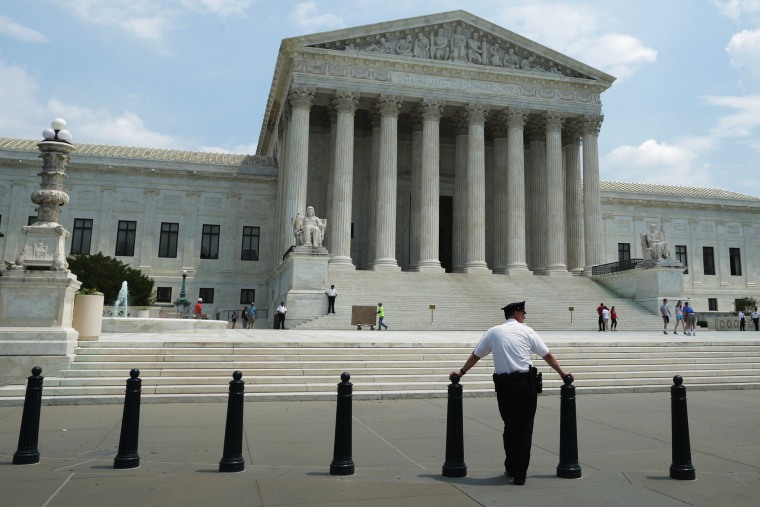If the White House and Senate Democrats are going to have any chance of success on filling the Supreme Court vacancy, they're going to need some Republican allies. It's a simple matter of arithmetic: the GOP has the Senate majority. If Mitch McConnell (R-Ky.) keeps his members in line, the unprecedented Republican blockade against any nominee, will succeed.
With this detail in mind, the search is on. Are there any Senate Republicans who are willing to do their duty and follow the constitutional process?
The obvious suspects would seem to be the GOP senators who are most worried about their re-election bids in battleground states. A partisan blockade isn't popular, so senators such as New Hampshire's Kelly Ayotte, Pennsylvania's Pat Toomey, and Ohio's Rob Portman are the sort of lawmakers who might choose a responsible path.
At least in theory, that is. All three have already endorsed blocking anyone President Obama nominates, sight unseen, regardless of his or her qualifications.
But perhaps no senator is as worried about his own job security as Sen. Mark Kirk (R-Ill.) -- who just happens to hold the seat Sen. Barack Obama once had, and who faces a tough re-election fight. Yesterday, the Illinois Republican wrote
an op-ed for the
Chicago Sun-Times in which he said what no one else in his party has been willing to say.
As a 23-year veteran of the U.S. Navy Reserve and as a United States senator, I swore an oath to protect and uphold the constitution. That oath is to our constitution, not to a party or any one individual, but to the ideals that bind our nation. In that role, I recognize the right of the president, be it Republican or Democrat, to place before the Senate a nominee for the Supreme Court and I fully expect and look forward to President Barack Obama advancing a nominee for the Senate to consider. I also recognize my duty as a senator to either vote in support or opposition to that nominee following a fair and thorough hearing along with a complete and transparent release of all requested information.
This is a break from the GOP line in more ways than one. Note, for example, that Republicans are arguing that the White House shouldn't even make a nomination at all, and Kirk has now argued the opposite. Republicans have also said that if there is a nominee, there should be no confirmation hearings and no floor vote, while Kirk now expects to see both.
It's a breakthrough of sorts, though as a matter of arithmetic, it's only a step in the right direction. The next question is whether Kirk has any like-minded GOP colleagues who'll join him.
Politico reported late yesterday on another Senate Republican who's skeptical of her party's gambit.
Sen. Susan Collins (R-Maine), breaking with her party leadership, said the Senate should take up President Barack Obama's nominee to the Supreme Court. "For my part, it's clear that the president can send up a nominee — regardless of where he is before he leaves office," Collins told CNN. "It is the duty of the Senate, under the Constitution, to give our advice and give our consent or withhold our consent. I believe we should follow the regular order and give careful consideration to any nominee that the president may send to the Senate."
In this case, "regular order" means what it sounds like: there's a vacancy; the president should send a qualified nominee to the Senate; and the Senate should consider the nominee and then vote on him or her.
Or put another way, Collins, like Kirk, wants to do the opposite of what GOP leaders intend to do.
So, that's two Senate Republicans out of 54 who are now on record supporting at least the idea of honoring the constitutional process. How many more are needed? Assuming the full, 46-member Senate Democratic caucus supports the eventual nominee -- an assumption that may or may not be accurate -- four Republican votes would create a 50-50 split, which would be good enough for confirmation. (Vice President Biden would break the tie.) Five Republican votes would create a 51-member majority.
But let's not forget that the Senate Majority leadership still controls the floor. A court nominee may enjoy majority support, but he or she could be blocked anyway if GOP leaders simply declare there will be no floor vote -- because they say so.
In other words, the road ahead will remain unfriendly terrain. Kirk and Collins offer the possibility of progress, but they'll need additional allies, and they'll need the Senate Republican leadership to allow an up-or-down vote.
The odds are less than favorable.
